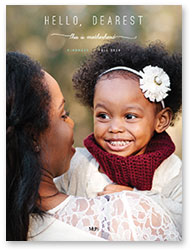Contact Us
After getting her graduate degree from Harvard and working as an analyst on Wall Street, Shaunti Feldhahn found herself unexpectedly drawn to the realm of social research. For the past 14 years, she has dedicated her brilliant mind to groundbreaking research on relationships. Most recently, her research has led her to study the earth-shaking power of kindness and resilience, which she writes about in her forthcoming book, The Kindness Challenge.
What drew you to your research on kindness?
As I released my book about men, For Women Only, I spent time with Nancy DeMoss Wolgemuth. We talked about how we often got asked what men need most from women … they deeply need to feel appreciated, respected and trusted. Then we would get the question, “What if I don’t feel that way about my man?” So Nancy proposed a challenge.
I started studying her challenge over the course of about 10 years and eventually it evolved into the 30 Day Kindness Challenge. As I saw people participate and got survey responses back, I started to realize that kindness is really a superpower. The research showed me how much change a few simple actions can bring to a relationship.
I think people want to be kind, but we have no idea just how often we are unkind. That’s what drew me to study this more systematically by doing a national research study on the power of kindness. I started to see this is a very little thing with a very big impact.
Can you tell me a bit more about the 30 Day Kindness Challenge?
As we started cataloguing what people were and were not doing to improve their life and their relationships, we found that kindness is actually made up of three completely different components. And this is what the 30 Day Kindness Challenge is based on.
We tell people to pick a person with whom they want a better relationship – or where they want to make a good relationship great. Then, for 30 days, don’t say anything negative about that person – either to them or about them to somebody else.
The second element is finding one thing, every day, you can praise about that person. Tell that person and tell somebody else. Every day.
The third element of kindness is to act generously. So for 30 days, in addition to not being negative and instead finding things to praise, do one small act of kindness for that person.
I found in the research that when you do those things consistently, it impacts the other person; but it completely changes you.
We found your feelings toward that other person start to change. You actually start feeling the things that are positive and praiseworthy. They start shining out like a spotlight; and the things that drove you crazy before diminish because you are not so focused on them. I’ve found that people want to start being the person the other person needs – being appreciative, kind and loving.
The power of that was astounding once we saw the results in the research. We found that 89 percent of relationships improved. It didn’t matter if it was a spouse, child, in-laws, your crazy neighbor who drives you nuts. Kindness is a superpower.
What part of your research surprised you the most?
The thing that almost made me cry was something profound we found in the survey results. The person doing the 30 Day Kindness Challenge was the one doing all the work. Right? Most of the time, the other person didn’t even know they were doing it. At the end of the 30 days, the person doing all the work actually felt more loved and appreciated too. Which is so powerful because they were the one putting out all the effort, but in the end felt like they were far more special to the other person – even though that person wasn’t part of the challenge! We found that kindness completely melts through walls. And because it melts through walls, it touches the heart of the other person – whether or not they want to be touched – and it changes how that person feels about you.
So, you may be the one doing the work, but the appreciation comes back toward you because it completely transforms the dynamic of the relationship. Ultimately, what we have found is that whether or not you thrive in life and in your relationships is far more related to how you treat other people than how you yourself are treated.
I think all of us can agree, based on the things that are happening in the world, there is so much unkindness. However, deep down everyone has this longing for kindness. And this is an opportunity for us to step up and restore that in our culture.
What did you learn about yourself in this research?
I had no idea how unkind I was every day.
When I started doing this research, I thought, Thankfully I’ve got that one. And as I started cataloging the types of negativity, I started thinking, Oh my word! I had no idea, for example, exasperation is a type of negativity. Exasperation says, “You’re an idiot,” without actually using those words. I realized, I get exasperated with my kids ALL the time. There are so many things that we would never think of as negativity, that are.
Can you tell me more about other types of negativity?
Another one that a lot of people don’t think about is sarcasm. Many people think of it as joking. Like in our family we trash talk a lot and everyone knows it’s well-intentioned. But I didn’t realize that when it happens too much, even if it’s well-intentioned, it gets exhausting and starts to beat people down. I found pretty consistently that, as an unseen, unrecognized negativity, it interferes with relationships. It interferes with intimacy because people use it as a protective mechanism. I had one woman who was going through really difficult times in her family. She used sarcasm to avoid going deep and letting people in.
Another type, which is more overt, is the subconscious feeling of, “You hurt me, so I hurt you.” For example: Let’s say somebody hurt you and you pull away. In most cases, it’s an explicit shut down to make the other person feel bad, as opposed to opening up and being vulnerable. The way of improving the relationship is not to shut down. It’s not to say mean things. It’s not to vent about them to another person. The way of restoring this relationship is to do this hard thing of being kind to them. It’s so against our human nature and against what culture tells us to do, but we’ve found that action is what is going to restore the relationship.
Another type of unseen negativity is venting about that person to somebody else. We don’t realize how much it hurts us. All it does is reinforce in our minds the problem in the relationship with the other person.
Kindness is not just a nice, sweet, fluffy, vague idea: Kindness is an incredibly strong, almost tangible, superpower that transforms lives and relationships.
How can women, especially mothers, make kindness a part of their daily practice?
We’ve seen in the research that in order to do something daily, you have to recognize what needs to be done, and that means you have to open your eyes to the places where you are not being kind. So I would recommend, especially to moms who have so many demands in front of them, to take the time to do something really simple – like the Kindness Challenge. Do it together – don’t just try to do it on your own. This is the kind of thing that’s really helpful to do with a buddy, or ten.
There is no substitute for the benefit of doing something together, purposefully, for a few weeks. It opens your eyes and gives you a path to follow. After the few weeks are over, you can decide if you want to keep going with it. Ultimately, it becomes much more of a habit, and eventually a lifestyle driven by kindness.
Pre-order The Kindness Challenge at wmbooks.com/thekindnesschallenge.

This article originally appeared in the Fall 2016 issue of Hello, Dearest. If you didn’t get a copy and would like your own, you can subscribe to get Hello, Dearest in your mailbox every season. If you subscribe, forward your receipt to magazines@mops.org and we’ll shoot a copy of the current issue in the mail to you for free … just because we like you.
